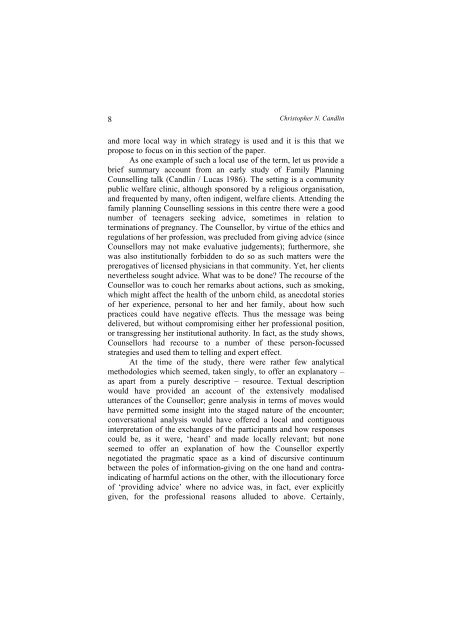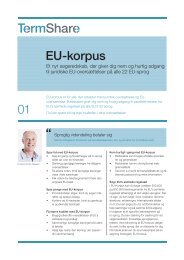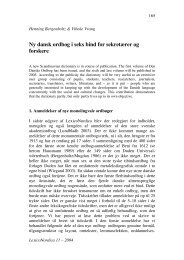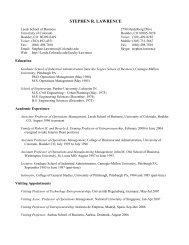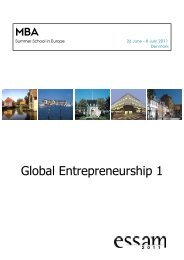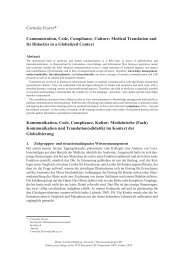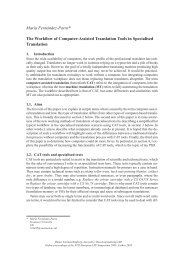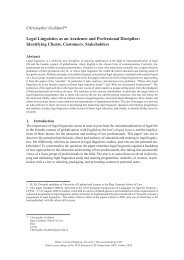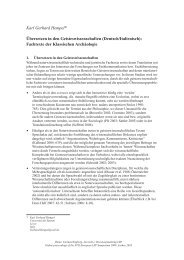Accounting for Interdiscursivity: Challenges to Professional Expertise
Accounting for Interdiscursivity: Challenges to Professional Expertise
Accounting for Interdiscursivity: Challenges to Professional Expertise
Create successful ePaper yourself
Turn your PDF publications into a flip-book with our unique Google optimized e-Paper software.
8<br />
Chris<strong>to</strong>pher N. Candlin<br />
and more local way in which strategy is used and it is this that we<br />
propose <strong>to</strong> focus on in this section of the paper.<br />
As one example of such a local use of the term, let us provide a<br />
brief summary account from an early study of Family Planning<br />
Counselling talk (Candlin / Lucas 1986). The setting is a community<br />
public welfare clinic, although sponsored by a religious organisation,<br />
and frequented by many, often indigent, welfare clients. Attending the<br />
family planning Counselling sessions in this centre there were a good<br />
number of teenagers seeking advice, sometimes in relation <strong>to</strong><br />
terminations of pregnancy. The Counsellor, by virtue of the ethics and<br />
regulations of her profession, was precluded from giving advice (since<br />
Counsellors may not make evaluative judgements); furthermore, she<br />
was also institutionally <strong>for</strong>bidden <strong>to</strong> do so as such matters were the<br />
prerogatives of licensed physicians in that community. Yet, her clients<br />
nevertheless sought advice. What was <strong>to</strong> be done? The recourse of the<br />
Counsellor was <strong>to</strong> couch her remarks about actions, such as smoking,<br />
which might affect the health of the unborn child, as anecdotal s<strong>to</strong>ries<br />
of her experience, personal <strong>to</strong> her and her family, about how such<br />
practices could have negative effects. Thus the message was being<br />
delivered, but without compromising either her professional position,<br />
or transgressing her institutional authority. In fact, as the study shows,<br />
Counsellors had recourse <strong>to</strong> a number of these person-focussed<br />
strategies and used them <strong>to</strong> telling and expert effect.<br />
At the time of the study, there were rather few analytical<br />
methodologies which seemed, taken singly, <strong>to</strong> offer an explana<strong>to</strong>ry –<br />
as apart from a purely descriptive – resource. Textual description<br />
would have provided an account of the extensively modalised<br />
utterances of the Counsellor; genre analysis in terms of moves would<br />
have permitted some insight in<strong>to</strong> the staged nature of the encounter;<br />
conversational analysis would have offered a local and contiguous<br />
interpretation of the exchanges of the participants and how responses<br />
could be, as it were, ‘heard’ and made locally relevant; but none<br />
seemed <strong>to</strong> offer an explanation of how the Counsellor expertly<br />
negotiated the pragmatic space as a kind of discursive continuum<br />
between the poles of in<strong>for</strong>mation-giving on the one hand and contraindicating<br />
of harmful actions on the other, with the illocutionary <strong>for</strong>ce<br />
of ‘providing advice’ where no advice was, in fact, ever explicitly<br />
given, <strong>for</strong> the professional reasons alluded <strong>to</strong> above. Certainly,


